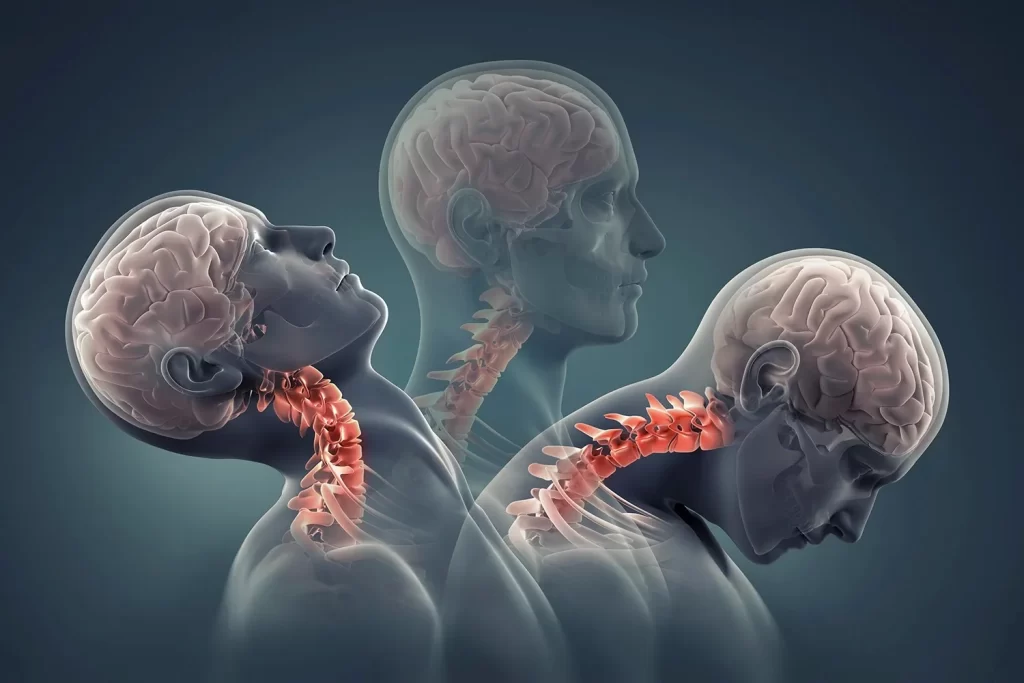Table of Contents
Were you recently in a car accident and now have a headache? This isn’t something to ignore. These are more common than people realize, but they are not something to consider normal. It’s essential to consult a doctor as soon as possible to rule out any serious conditions.
The Seriousness
Headaches following an accident can indicate severe injuries. Prompt medical attention can help reduce long-term effects and improve your recovery. Remember, not all headaches are the same, and those after an accident could signal something more serious.

Misconceptions
Many people believe they are due to trauma and stress. While stress can cause these, it’s crucial not to dismiss these seeing an experienced accident doctor. Only a professional can determine If you have a minor headache, or you have a TBI.
Common Causes
These are often caused by whiplash or closed head injuries. If you experience persistent headaches after an accident, it’s vital to see a car accident doctor. These symptoms might indicate a more severe injury.
Delayed Headaches: What to Do
It’s possible to feel fine immediately after an accident, with them developing hours or even days later. If you start experiencing them constantly, days after the incident, seek medical attention right away. Delayed head injuries are possible and can become serious if left untreated.
Recognizing Serious Head Injury Symptoms
Whether you notice symptoms immediately after an accident or a few days later, these signs could indicate a serious head injury that requires prompt medical attention:
- Vomiting
- Loss of consciousness
- Dizziness
- Shoulder, neck, or back pain with headaches
- Memory loss or changes in personality
- Severe headaches
- Head injury
- Neck stiffness, fever, mental status changes, vision changes, seizures, speech difficulties, numbness, or weakness
If you experience any of these symptoms, visit an emergency room or consult an accident doctor immediately. Early treatment can significantly improve your recovery.
Causes of Headaches After an Accident
Various injuries from a car accident can lead to headaches, some of which may be serious. Here are common causes:
Blow to the Head
During a collision, your head might strike parts of the car interior, such as the steering wheel, door window, or even another passenger. Symptoms may not be immediately apparent due to the shock of the accident. Any blow to the head should be taken seriously and evaluated by a doctor. Potential injuries include ruptured blood vessels or a fractured skull, which may require a CT scan to assess.
Whiplash

Whiplash is a frequent cause. This condition occurs when the neck is rapidly jerked backward and then forward, often in rear-impact collisions. Whiplash can inflame and irritate the nerves, tendons, and muscles in the neck, leading to headaches.
The pain typically starts in the neck and radiates to the head, lasting from 30 minutes to several hours. Whiplash-related headaches can be severe and should be treated by a medical professional to avoid long-term consequences.
Whiplash affects the neck’s nerves, tendons, and muscles, which connect to the head. The inflammation and irritation of these structures can lead to headaches.
The pain often begins in the neck and moves to the head, sometimes becoming more intense than the initial neck pain. Whiplash can result from auto accidents, sports injuries, or other incidents where the head moves rapidly back and forth.
Skull Fracture
Skull fractures are more severe and potentially fatal if not treated promptly. Skull fractures often involve internal bleeding, leading to permanent brain injuries or death. If you notice bruising on your face, blood from your ear, or swelling, seek emergency medical attention immediately.
Symptoms of a Skull Fracture
- Bleeding from ears, nostrils, or around the eyes
- Bruising on the face or head
- Swelling and tenderness
- Indentation on the head
A skull fracture usually results from a strong blow to the head. Such an injury may cause brain damage if a piece of bone penetrates the brain. If you experience headaches following a head injury in a car accident, visit the emergency room for an X-ray or CT scan to determine the extent of the injury and receive appropriate treatment.
Hypertension
After a car accident, some individuals experience spikes in blood pressure, leading to severe headaches. This occurs due to the rapid rise in blood pressure, causing increased pressure in the head. Over-the-counter pain relievers like aspirin won’t alleviate the pain associated with this, and untreated hypertension can lead to additional health issues.
Symptoms of Hypertension
- Blurred vision
- Chest pain
- Nausea
If you notice a sudden increase in blood pressure and experience severe headaches after an accident, seek medical attention immediately. Proper diagnosis and treatment are crucial to prevent further complications.

Understanding Concussions
A concussion is a brain injury that can range from mild to severe, and only a doctor can determine its severity. Concussions often result from a blow to the head during a car accident. Sometimes, individuals may not realize they have a concussion as symptoms can be subtle or delayed.
Symptoms of a Concussion:
- Amnesia related to the accident
- Confusion
- Delayed response
- Dizziness
- Head pain
- Loss of consciousness
- Nausea
- Ringing in the ears
- Slurred speech
- Vomiting
A concussion occurs when the brain, cushioned by surrounding fluid, hits the skull due to a blow to the head. This impact can cause bruising and severe head pain. If you suspect a concussion, seek emergency medical treatment immediately.
Stress-Related
The stress from an accident and the associated injuries can lead to these. While stress-induced headaches are generally less severe, they still warrant medical attention to rule out other causes.
Different Types of Headaches Associated with Car Accidents
- Vascular: Caused by poor or abnormal cerebral circulation, these headaches can persist for months after a whiplash injury.
- Migraines: Common after whiplash, migraines typically begin within hours or days of the injury.
- Analgesic Rebound: Result from overuse of pain medication or side effects of prescribed medication for whiplash pain.
- Sympathetic Nerve Dysfunction: Caused by damage to the cervical nerve trunk.
Post-Traumatic
Post-traumatic headaches can significantly impact your mood and overall well-being. Although not life-threatening, they can lead to serious emotional issues, including suicidal thoughts. If diagnosed with post-traumatic headaches, consider seeking therapy for comprehensive care.
Post-Traumatic Symptoms:
- Tightness or pressure across the forehead or back of the head
- Loss of appetite
- Sensitivity in the scalp, shoulders, and neck muscles
- Dull, aching head pain
Post-Traumatic Types
- Musculoskeletal
- Cluster
- Cervicothoracic somatic dysfunction
- Chronic facial pain
- Nerve dysfunction
- Migraine
- Chronic
- Vascular
- Tension-type
Therapy can help manage the psychological effects of an accident, including guilt and stress, thereby reducing the frequency and severity.

Understanding the Difference Between a Migraine and a Headache
Headaches after car accidents, often called tension, can be difficult to distinguish from migraines. Unlike some types of migraines, these are not usually associated with visual disturbances like flashing lights or blind spots, and they don’t typically involve symptoms such as vomiting, nausea, one-sided numbness or weakness, or abdominal pain.
Types of Tension Headaches:
Episodic
- These can occur from 30 minutes to a week after the incident.
- Frequent episodic headaches can become chronic if they persist.
Chronic
- These can last for hours.
- If they occur for 15 days or more per month over three months, they are classified as chronic.
Causes
The exact cause of tension headaches is not fully understood. Experts believe they may result from muscle contractions in the scalp, neck, and face, or from increased emotional stress such as sadness or anxiety. Another theory is heightened sensitivity to stress and pain, making individuals more prone to tension headaches.
Treatment
Tension headaches are common, and many people treat them at home with over-the-counter painkillers. However, other treatment options are available:
- Painkillers: OTC painkillers like aspirin or ibuprofen can provide relief.
- Combination Drugs: Medications combining acetaminophen or aspirin with caffeine can be more effective than single medications.
- Narcotics and Triptans: While helpful, narcotics should be avoided due to their potential for addiction and side effects.
Risk Factors
- Women are more likely to suffer from tension headaches than men.
- The risk increases with age, particularly after 40.
- Closed head injuries, which are not visible externally
Diagnosing Closed Head Injuries
If you suspect a more serious issue than a tension headache, consult a doctor immediately. They may order an MRI or CT scan to determine the presence and extent of a closed head injury. These scans can reveal conditions such as cysts, tumors, sinus issues, injured blood vessels, brain swelling, inflammation, bleeding, and other signs of injury.
Effective Treatments

If you’re experiencing headaches from whiplash after a car accident, proper treatment is essential. While muscle relaxers and painkillers prescribed in the emergency room can help manage pain, they don’t address the underlying cause of whiplash-related headaches. Here are some effective treatments:
- Chiropractic Care: Chiropractors specialize in treating injuries related to the spine and neck, including ligaments, muscles, and tendons. Chiropractic adjustments can significantly alleviate headaches caused by whiplash.
- Cold Packs: Applying cold packs can reduce swelling and provide temporary relief.
- Range of Motion Exercises: These exercises help restore the affected area’s movement, which is crucial for recovery.
- Muscle Strengthening: Strengthening exercises can support the neck and prevent further injury.
- Electrical Stimulation: This treatment can reduce pain and promote healing in the affected area.
In some cases, immobilizing the neck may be recommended, but it’s important to restore the range of motion through targeted exercises. Chiropractors listed on our website can provide comprehensive treatment for these conditions.
What to Do if You Have a Headache After a Car Accident
If you experience a headache following a car accident, seek medical attention right away for an accurate diagnosis. While painkillers can provide temporary relief, seeing a doctor might help address the root cause of your pain. Prompt medical consultation can provide peace of mind and ensure proper treatment, whether it is is due to whiplash or a more serious closed head injury.
For more information and assistance, consult with the accident doctors listed on our website.




 Since 2012, Accident Doctor has been dedicated to connecting personal injury patients and attorneys with qualified physicians who specialize in treating accident-related injuries. Our nationwide network includes experienced medical professionals who provide care for individuals involved in car accidents, motorcycle accidents, truck and tractor-trailer collisions, slip and fall incidents, and workers’ compensation cases.
Since 2012, Accident Doctor has been dedicated to connecting personal injury patients and attorneys with qualified physicians who specialize in treating accident-related injuries. Our nationwide network includes experienced medical professionals who provide care for individuals involved in car accidents, motorcycle accidents, truck and tractor-trailer collisions, slip and fall incidents, and workers’ compensation cases.